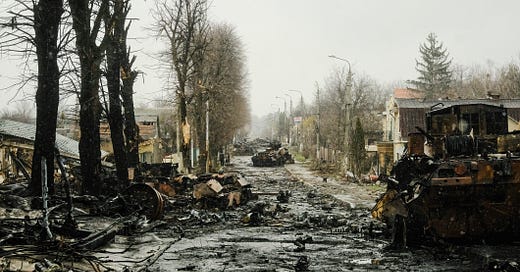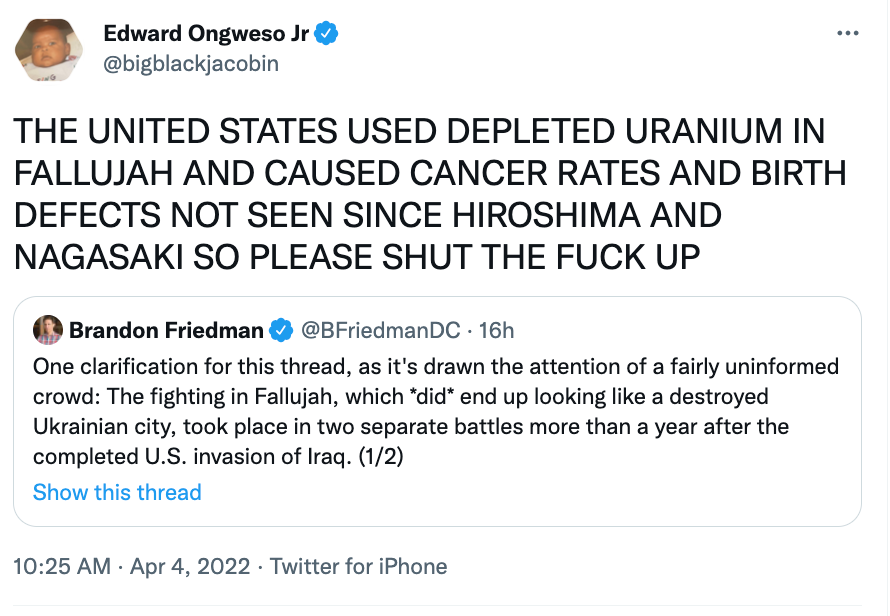Hold Russia Accountable—But Don't Stop There
We should treat Ukraine as a turning point in the effort to curb the atrocities carried out around the world, including in our name.
The images from Ukraine right now are absolutely horrific. The one above this paragraph, which shows the Kyiv suburb of Bucha in the wake of the Russian army’s retreat from the area, is relatively restrained because it does not show the hundreds of dead bodies reportedly littered all over the city, or piled into mass graves. Plenty of those kinds of pictures do exist, and they are as terrible as you would expect. If anyone ever doubted the indiscriminate brutality of the Russian assault on Ukraine—and I don’t really know why that would be the case—let the awfulness of what the Russians did in Bucha snap some sense into them.
It seems inevitable that Bucha will be added, alongside Mariupol, to the list of places whose very name becomes synonymous with the worst atrocities of wartime. The scale of the cruelty apparently visited on civilians—including widespread reports of systematic rape—has once again sparked calls, including from Joe Biden, for Vladimir Putin to be prosecuted for war crimes, which he clearly should be. Hopefully, it also sparks something else—a broader reflection about war itself as it is waged all over the world, including by the United States.
I shouldn’t have to stress that this is not to downplay what is happening in Ukraine, but the discourse around this issue has become poisonous enough that I probably need to. So let me emphasize: I am not chiding anyone for caring about Ukraine, or for feeling empathy for Ukrainians, or for being focused on this particular conflict. There is a senseless assault on innocent people unfolding in plain sight in front of all of us. It is being waged by someone whose values and motivations are—or should be, at any rate—antithetical to anyone who considers themself a leftist, or even simply a good person, and its devastating impact on global peace and stability is crystal clear. That much we can (hopefully) all agree on. But, as I have written before, it shouldn’t take anything away from the attention rightly being given to Ukraine to also encourage people to step back for a second and think a little more widely about who exactly we hold accountable, and why.
Victims of My Lai or Fallujah or Abu Ghraib, to name just three episodes in the very long list of atrocities perpetrated by the United States military, would likely recognize the barbarism of the Russians. So too would the survivors of massacres carried out by U.S.-backed forces in places like El Salvador and Nicaragua and East Timor. So would Palestinians in Gaza. So would Yemenis being slaughtered by Saudi forces with the full complicity (and weapons sales) of the United States.
Somehow, though, these crimes—for crimes they most certainly are—never wind up before the Hague. They never leave a permanent stain—they are always regrettable blots on an otherwise unblemished record. And above all, they never disrupt the narrative the U.S. and its allies prefer to tell about the world, in which the West is always a beacon of peace and freedom, and only people who stand apart from it are capable of violating the norms of decency.
Over the last couple of days, a strange, fairly hideous dialogue has begun making the rounds online. Two examples:
I simply don’t understand the motivation to behave like this—to use the Russian invasion as a way to protect the seemingly impenetrable borders of the American exceptionalist myth, or to acknowledge war crimes only to wave them away. Why are people ranking things? Why is anyone trading war crimes stats like this was fantasy football?
Why not instead use this moment, when all of our eyes are trained on precisely the kinds of horrors that rightfully make us recoil, to demand the same level of accountability for our own governments, or the forces our governments support? Why not, as Americans, treat Ukraine as a turning point in our effort to curb the atrocities being carried out around the world, including in our name?
It baffles me that people think you have to somehow choose between the two, rather than recognize that these are features of war, that there are precious few clean hands when it comes to war, and that, if we want there to be less violence and heartbreak in the world, we should be just as vigilant about what the people who purportedly represent us do as we are about the people on the “other side.” No more Buchas, no more Mariupols, no more Groznys, no more Srebrenicas, no more Fallujahs, no more Sabra and Shatilas, no more My Lais, no more Hadithas, no more Kabuls, no more Abu Ghraibs, no more any of it. That does not really seem like too much to ask.
Today, corporate narratives dominate our media. Want an alternative?
Welcome to OptOut, a free news aggregation app for financially independent media you can trust. Read, listen to, and watch content about democracy, climate, justice, labor, and other topics that matter from voices that the corporate media overlooks. On OptOut, you can find Discourse Blog stories alongside your other favorite outlets. Download the iOS app today and sign up for OptOut's free newsletter.










Agreed. The what-aboutism as a closing door rather than an opening for further discussion paired with the inability of so many people to accept that it's possible to hold multiple thoughts at once---Ukraine invasion bad, our support of Ukraine good, US hypocrisy is bad so let's bring attention and try to fix it---is the bane of modern, social-media mediated discourse.
People have always used whataboutism to justify once-and-future transgressions, but it’s getting worse. The fact that we’re now at the point where false flags are created merely to be debunked to cast doubt on real atrocities just goes to show you where it’s going.